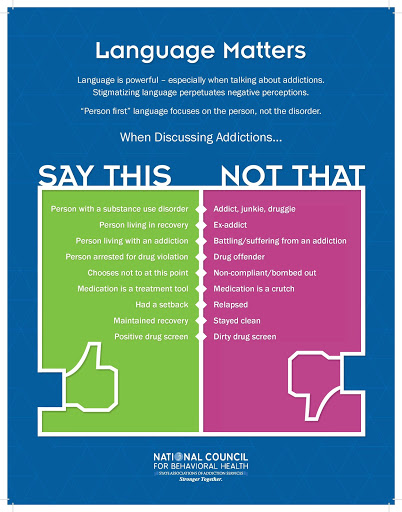One thousand and seventy four people died in 2017 in Philadelphia due to opioids, 84% of these cases involved fentanyl. Compared to 2003 when there were 211 opioid related deaths, it’s no understatement to refer to this drastic increase and as epidemic. There are many factors that have lead to this increase, namely fentanyl which is highly potent and utterly unregulated, however health care, or lack thereof, has played its role as well. All too often patients with substance use disorder are denied that respect and quality of care that is given to other patients. Providers are not exempt from the human inclination to prejudice. The language used in a medical office can have a huge impact on the level of trust and comfort a patient may feel. If someone is made to feel judged and guilty, why would they want to continue to try to find help?
The word “addict” carries with it the burden of years and years of stigma. This stigma has been ingrained into our society: in our laws, our healthcare systems, and our day to day interactions. In the short two months that I have served at Girard Medical Center as a Care Coordinator, I’ve not heard the word used once by any provider. The patients are treated as patients and nothing more or less than just that. I witnessed compassion beyond anything I had envisioned coming into this experience. Our medical supply closet is filled with hand-me-downs and extra blankets in preparation for the cold weather approaching. The food brought in by pharmaceutical representatives is often left out in the waiting room for the patients. Small gestures such as these, coupled with the avoidance of stigmatizing language, has created an environment where patients continue to come back, regardless of whether or not they have maintained their recovery. When consistent quality treatment can be provided, the impact is truly life-changing.
I am so grateful to be serving at a clinic with person-first care at its heart. As part of our training with the National Health Corps, we were taught to use a trauma-informed lens. In the most basic understanding, being trauma-informed simply means taking into consideration a patients’ past when offering care. At Girard Medical Center, this often means inquiring into patients childhoods and difficult moments, such as when they first started using. My training to be trauma-informed as helped me communicate with these patients in a respectful and understanding manner while avoiding judgement. Sticks and stones can break your bones, but words can also hurt you.

[Image Description: “Language Matters” poster from the National Council for Behavioral Health depicting phrases that should be said compared to their stigmatizing counterpart (for example, say “person living in recovery” rather than “ex-addict”)]
